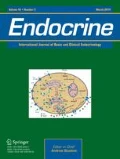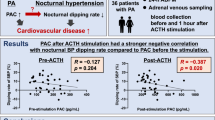Abstract
Purpose
The risks of Ramadan fasting on blood pressure (BP) in patients with adrenal insufficiency are unknown. This study aimed to evaluate the levels of BP and particularly the risk for hypotension during a fasting day compared with a nonfasting day in patients with corticotrope deficiency.
Methods
A prospective case-crossover study on 28 patients with known and treated corticotrope deficiency who were fasting the month of Ramadan. Clinical (eating and sleeping habits, abnormal symptoms, weight, height, and BP) and paraclinical (creatinine, sodium, and cortisol) data were collected. Patients had a 24 h ambulatory BP monitoring during a Ramadan fasting day then again during a nonfasting day.
Results
The data of 25 patients were analyzed; 20 women, median age: 40 years (IQR, 22.5–45.5), median duration of the disease: 6 years (IQR, 2.5–12). The prevalence of hypotension did not differ between the fasting day and the nonfasting day. Hour by hour BP levels comparison showed that both systolic and diastolic BP were significantly lower at 2.00 p.m. during fasting. BP variability was significantly lower during the fasting period compared with the same period during the nonfasting day.
Conclusions
Fasting was not associated with an increased risk for hypotension in patients with known and treated corticotrope deficiency.

Similar content being viewed by others
References
M. Chihaoui, F. Chaker, M. Yazidi, W. Grira, Z. Ben Amor et al. Ramadan fasting in patients with adrenal insufficiency. Endocrine (2017). https://doi.org/10.1007/s12020-016-1186-0
M. Chihaoui, W. Grira, J. Bettaieb, M. Yazidi, F. Chaker et al. The risk for hypoglycemia during Ramadan fasting in patients with adrenal insufficiency. Nutrition (2018). https://doi.org/10.1016/j.nut.2017.07.014
G. Mancia, R. Fagard, K. Narkiewicz, J. Redón, A. Zanchetti et al. 2013 ESH/ESC guidelines for the management of arterial hypertension. J. Hypertens. (2013). https://doi.org/10.1097/01.hjh.0000431740.32696.cc
A. Shehab, A. Abdulle, A. El Issa, J. Al Suwaidi, N. Nagelkerke et al. Favorable changes in lipid profile: the effects of fasting after Ramadan. PLoS ONE (2012). https://doi.org/10.1371/journal.pone.0047615
S. Ongsara, S. Boonpol, N. Prompalad, N. Jeenduang. The effect of Ramadan fasting on biochemical parameters in healthy Thai subjects. J. Clin. Diagn. Res. (2017). https://doi.org/10.7860/JCDR/2017/27294.10634
NS. Al-Barha, KS. Aljaloud. The effect of Ramadan fasting on body composition and metabolic syndrome in apparently healthy men. Am. J. Mens Health. (2019). https://doi.org/10.1177/1557988318816925
R. Habbal, L. Azzouzi, K. Adnan, A. Tahiri, N. Chraibi, Variations of blood pressure during the month of Ramadan. Arch. Mal. Coeur Vaiss. 91, 995–998 (1998)
G. Perk, J. Ghanem, S. Aamar, D. Ben-Ishay, M. Bursztyn, The effect of the fast of Ramadan on ambulatory blood pressure in treated hypertensives. J. Hum. Hypertens. 15, 723–725 (2001)
E. Ural, G. Kozdag, T. Kilic, D. Ural, T. Sahin et al. The effect of Ramadan fasting on ambulatory blood pressure in hypertensive patients using combination drug therapy. J. Hum. Hypertens. 22, 208–210 (2008)
AI. Al-Shafei, Ramadan fasting ameliorates arterial pulse pressure and lipid profile, and alleviates oxidative stress in hypertensive patients. Blood Press. (2014). https://doi.org/10.3109/08037051.2013.836808
B. Bernieh, M.R. Al Hakim, Y. Boobes, F.M. Abu Zidan, Fasting Ramadan in chronic kidney disease patients: clinical and biochemical effects. Saudi J. Kidney Dis. Transpl. 21, 898–902 (2010)
F. Samad, F. Qazi, M.B. Pervaiz, D.K. Kella, M. Mansoor, Effects of Ramadan fasting on blood pressure in normotensive males. J. Ayub Med. Coll. Abbottabad 27, 338–342 (2015)
A. Seker, H. Demirci, G. Ocakoglu, U. Aydin, H. Ucar et al. Effect of fasting on 24 h blood pressure values of individuals with no previous history of hypertension. Blood Press. Monit. (2017). https://doi.org/10.1097/MBP.0000000000000244
Acknowledgements
The authors thank Professor Alaya Kacem for language assistance.
Author information
Authors and Affiliations
Corresponding authors
Ethics declarations
Conflict of interest
The authors declare that they have no conflict of interest.
Ethical approval
All procedures performed in studies involving human participants were in accordance with the ethical standards of the University Hospital La Rabta of Tunis and with the 1964 Helsinki declaration and its later amendments or comparable ethical standards.
Informed consent
Informed consent was obtained from all individual participants included in the study.
Additional information
Publisher’s note Springer Nature remains neutral with regard to jurisdictional claims in published maps and institutional affiliations.
Rights and permissions
About this article
Cite this article
Chihaoui, M., Grira, W., Chaker, F. et al. Blood pressure evaluated by 24 h ambulatory blood pressure monitoring in Ramadan-fasting patients with corticotrope deficiency. Endocrine 68, 210–214 (2020). https://doi.org/10.1007/s12020-020-02213-8
Received:
Accepted:
Published:
Issue Date:
DOI: https://doi.org/10.1007/s12020-020-02213-8




